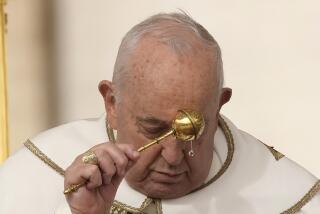Benedict Urges Peace in His First Easter Address
ROME — In a sea of tulips, lilies and tens of thousands of pilgrims, Pope Benedict XVI celebrated his first Easter as pontiff, marking Christendom’s most sacred event with a call for peace in the world’s many wars.
Benedict, who was elected pope a year ago this week, touched on sensitive conflicts, including the international showdown with Iran over its nuclear capabilities.
He urged that “serious and honest negotiations” be undertaken to reach an “honorable solution” to the global nuclear standoff. He did not mention Iran by name, but the reference was clear.
He also said the resurrection of Jesus, which is celebrated at Easter, should bring hope to a humanity often bound by the “chains of suffering and death.”
The regal Mass at St. Peter’s Square capped Holy Week observances that were both solemn and bittersweet. Roman Catholics were inevitably reminded that during Easter celebrations a year ago, a weakened John Paul II was unable to address a single service. He died the next week.
Dressed in burnt-gold vestments and a sparkling miter, Benedict, who turned 79 on Sunday, led the Easter Mass before an estimated 80,000 worshipers and tourists who packed into the Vatican piazza on a blustery day under sunny skies.
After the service, he ascended to the main, velvet-draped balcony of St. Peter’s Basilica to deliver the traditional “Urbi et Orbi” message, Latin for “to the city and the world.”
“Today, even in this modern age marked by anxiety and uncertainty, we relive the event of the resurrection, which changed the face of our life and changed the history of humanity,” he said.
Sounding a theme central to his year-old papacy, Benedict sought to link Christian identity to the pursuit of justice and reconciliation throughout the world. He called for peace in Iraq to “finally prevail over the tragic violence that continues to mercilessly claim victims.”
He prayed for a resolution to the Israeli-Palestinian conflict that gives the Palestinians a state “truly their own” while reaffirming Israel’s right to exist. He urged all parties in the Holy Land to continue a “patient and persevering dialogue, so as to remove both ancient and new obstacles, avoiding the temptation of reprisal and educating the new generations about mutual respect.”
The comment came as many Western governments are cutting off relations with the Palestinian leadership after the radical Islamic Hamas movement won parliamentary elections this year in the West Bank and Gaza Strip.
The Urbi et Orbi message traditionally reviews troubles across the globe. It was broadcast on television to 65 countries, the Vatican said.
The pope condemned the scourge of kidnappings in Latin America and the violent refugee crisis in the Darfur region of western Sudan, a “situation that is no longer sustainable.”
As the multinational crowd applauded and cheered, Benedict ended the ceremony with Easter salutations delivered in 62 languages, from Arabic and Aramaic to Urdu and Vietnamese.
Easter brought Holy Week to a close, and Benedict was planning to spend the next couple of days at the papal vacation residence in Castel Gandolfo, in the hills south of Rome.
Earlier, with the memory of John Paul in the air, Benedict led one of the most dramatic ceremonies, the Good Friday procession known as the Via Crucis, or the Way of the Cross, which symbolizes Jesus’ passion and death on a crucifix. The nighttime procession entered Rome’s Colosseum, thousands of people lighting the way with candles.
Benedict carried a large wooden cross for a portion of the service.
Another Good Friday service at St. Peter’s Basilica was used to criticize both “The Da Vinci Code,” the wildly successful novel and forthcoming movie that questions the divinity of Jesus, and the Gospel of Judas, an ancient, newly authenticated manuscript that portrays Judas, the traditional betrayer of Jesus, in a more positive light. The manuscript is considered heretical by the church.
Father Raniero Cantalamessa, the official Preacher to the Papal Household who is called on to deliver a sermon to the pope and other senior prelates at important occasions such as Easter, said such texts were money-making propaganda that insulted Christ and Christianity.
“Christ is still getting sold -- no longer for 30 coins,” he said in an allusion to the biblical account of the betrayal of Jesus, “but to editors and publishers for millions.”
Saturday evening was the Easter vigil, when Benedict entered a darkened St. Peter’s Basilica with a single candle, which was then used to light eventually thousands of candles held by members of the congregation.
Benedict, whose papacy thus far has been marked with especially eloquent, rich homilies, described the resurrection of Jesus as the central mystery of the Catholic faith.
“If it were simply that somebody was once brought back to life, and no more than that, in what way should this concern us? But the point is that Christ’s resurrection is something more, something different,” the pope said.
“If we may borrow the language of the theory of evolution, it is the greatest ‘mutation’ -- absolutely the most crucial leap into a totally new dimension -- that there has ever been in the long history of life and its development: a leap into a completely new order which does concern us, and concerns the whole of history.”
Throughout Rome, bells tolled before midnight Saturday to signal the advent of Easter.
More to Read
Sign up for Essential California
The most important California stories and recommendations in your inbox every morning.
You may occasionally receive promotional content from the Los Angeles Times.











